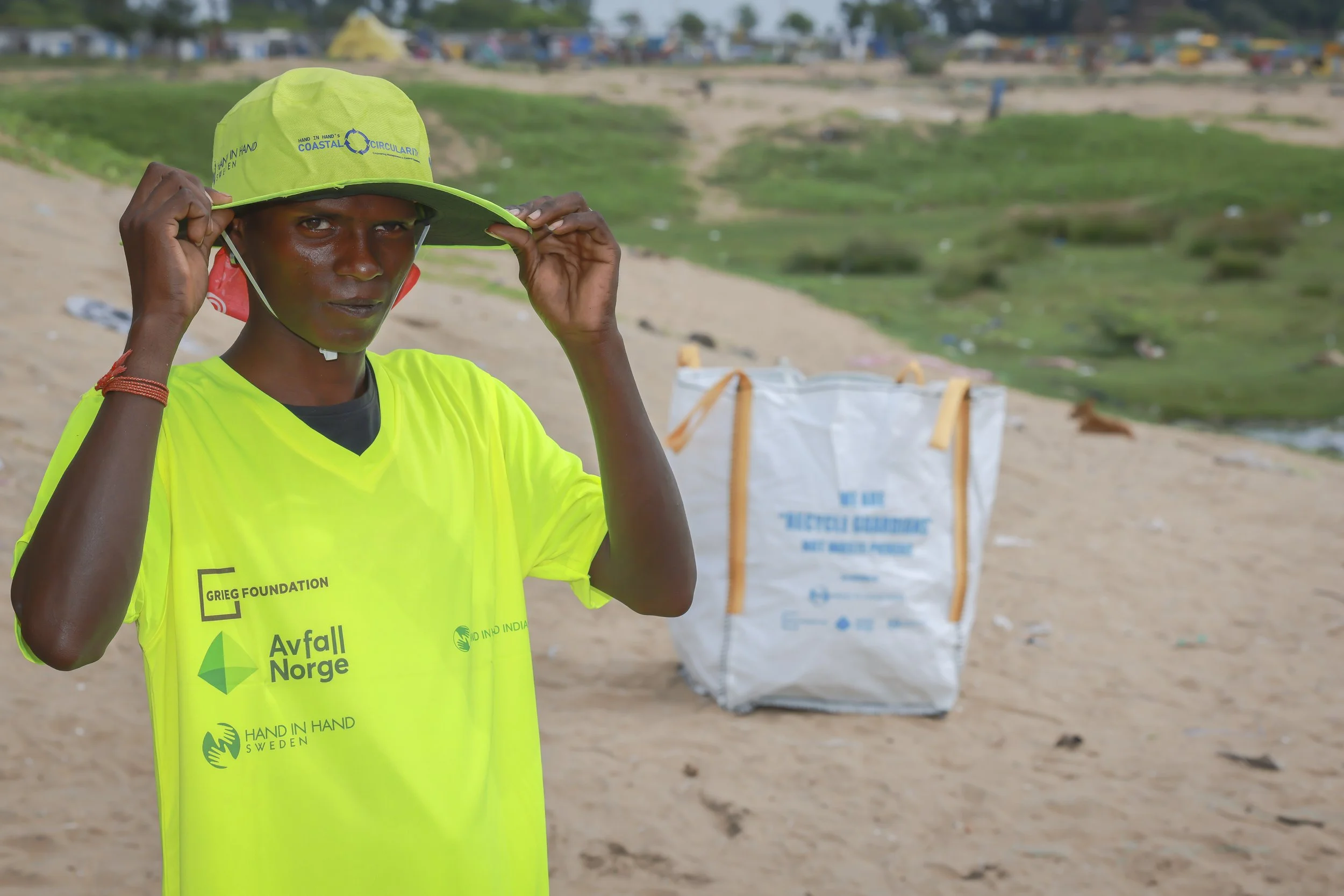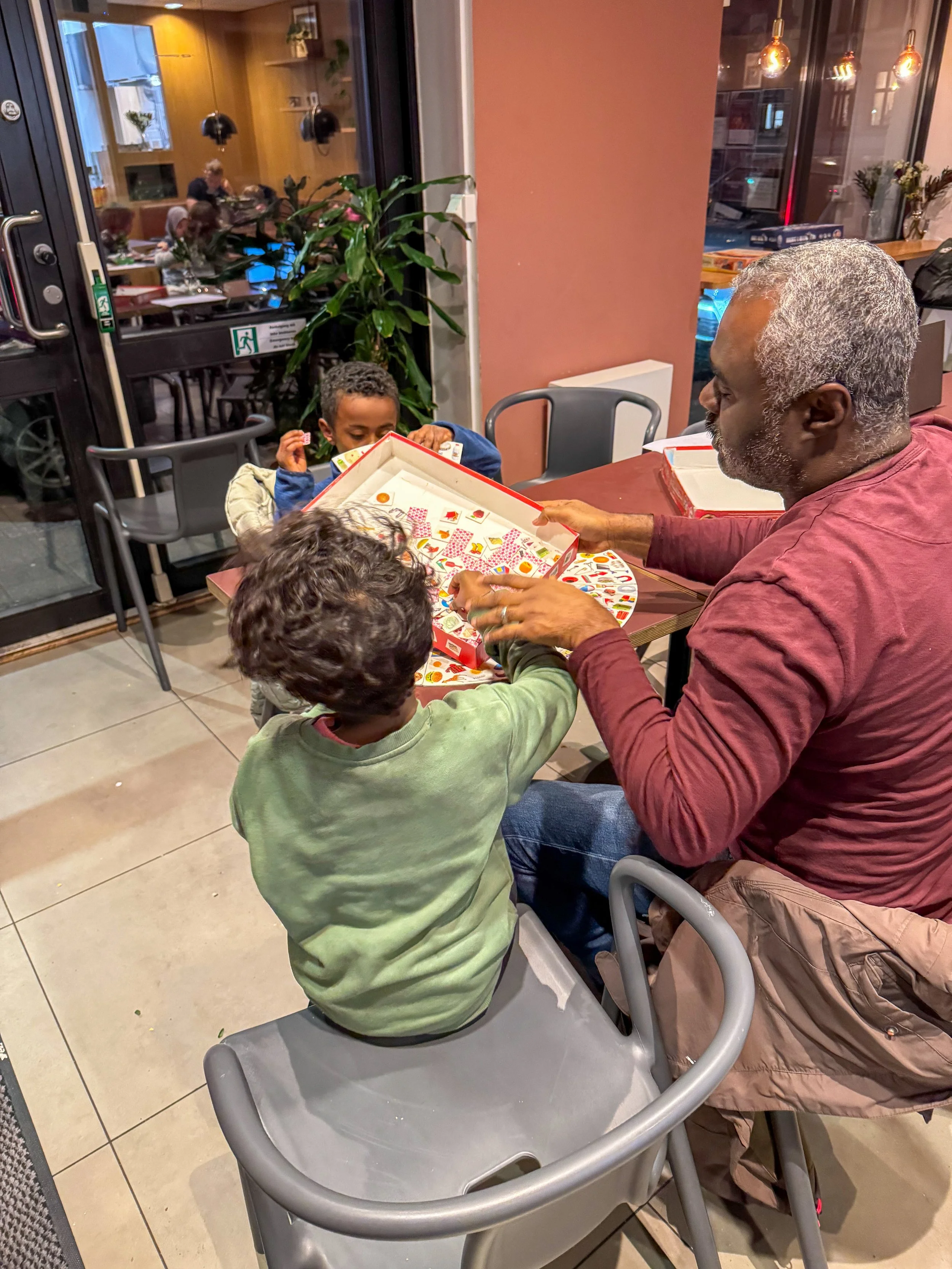Empowering Waste Pickers in Tamil Nadu
Grieg Foundation is supporting CLOCC’s efforts in India by contributing to the empowerment of the informal waste sector.
India's informal recycling sector is estimated to employ around 4 million people. They form the backbone of the recycling system, collecting, sorting, and recovering materials of value that would otherwise be lost. Despite this vital contribution, they remain highly marginalized, with low incomes, excluded from social systems, working without safety equipment, and facing risks such as traffic accidents while collecting waste on busy roads.
The coastal region of Tamil Nadu, India, is home to 2.8 million people. The area suffers from inadequate waste management, with significant volumes of waste entering the oceans and surrounding environment. Many residents rely on informal waste collection to survive.
The CLOCC programme, supported by the Grieg Foundation, has been working for just over a year with Hand-in-Hand Sweden and local partner Hand-in-Hand India to strengthen the role of informal waste workers, known locally as Recycle Guardians, to reduce waste leakage while improving their livelihoods. To strengthen both dignity and visibility, the project intentionally adopted the term “Recycle Guardians” in place of “waste pickers,” recognising participants as environmental stewards and shifting community perceptions from stigma toward pride and respect. Working across 12 clusters in Chengalpattu District, the programme has been mobilising and organising participants into cohesive groups that provide identity, bargaining power, and safer working conditions.
“We are Recycle Guardians, Not Waste Pickers”
Since the start of the programme, 336 families (592 individuals) have been mobilised and organised into functional groups. Group identity has been reinforced through high-visibility uniforms and PPE carrying the message “We are Recycle Guardians, Not Waste Pickers.” All 592 participants received PPE kits (gloves, shoes, caps, high-vis t-shirts), pairing dignity with practical protection during collection.
Early efforts focused on literacy and numeracy, with more residents joining as the programme progressed. Across the year, all 592 Guardians completed literacy, numeracy and finance modules, supported by 300 literacy kits and 150 piggy banks that help households sustain new habits.
As education levels rise, Hand-in-Hand India introduced more practical training to ensure long-term employment opportunities in waste management. Guardians completed training across the recyclable waste value chain, sorting skills, and client & customer networking—with coverage reaching the full cohort of 592 over the year. These sessions address past gaps in recognition and negotiation, equipping participants to identify materials, improve bale quality, and secure fairer, steadier prices.
Beyond training, the programme invests in household safety and productivity. Families received 150 hygiene kits and 160 first-aid kits, and 60 solar lighting systems were installed at homes and shelters to reduce fire risk, improve night-time safety, and support daily routines. On the mobility front, 35 powered tricycles were repaired and 10 pedal tricycles provided, directly increasing daily collection capacity and reducing physical strain. In parallel, 160 Recycle Guardians were connected to digital market linkages for real-time pricing and sorting know-how.
One of the programme’s greatest success stories is formal recognition and income stability. Seven Recycle Guardians (all women) have transitioned into municipal/panchayat sanitation roles, each earning about ₹10,000 per month while continuing to collect recyclables outside working hours. Combining a stable , fixed salary with other income has offered much needed security and stability.
For example, Mrs. Priya, a single mother of three, struggled to provide for her children. Mrs. Mari lived in a cramped hut with her extended family, while Mrs. Selvi had limited means to support her household. Today, they enjoy greater stability and recognition through formal employment.
A major barrier for many families has been the lack of Aadhaar documentation (proving identity and address). The programme has organised Aadhaar enrolment support for 32 individuals (including 13 children) who were assisted directly with the documentation, allowing them access to welfare schemes, education, and healthcare.
The project also brings communities together to divert waste from the ocean. In Mahabalipuram, 69 Recycle Guardians and 10 municipal staff removed roughly 2 metric tons of waste in a single morning, with municipal leaders publicly recognising participants and pledging to improve links to social services. To reduce contamination at tourist sites, five PET-only collection bins were installed and to strengthen value-chain understanding, 50 Guardians joined visits to recycling plants over the year (including an early cohort near Kelambakkam).
The programme has demonstrated a powerful combination of social and environmental impact. Recycle Guardians are gaining stability, recognition, and safer working conditions, while communities benefit from cleaner public spaces and stronger local waste systems. With continued support from the Grieg Foundation, this integrated approach is laying the groundwork for lasting, district-wide change.
Related stories
STORIES FROM OUR PRIORITY AREAS
All · Children & youth · Music & culture · Health & research · Climate action · Social impact investment









